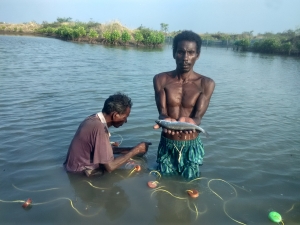Newsroom :: News :: Integrated Mangrove Fisheries Farming System: Scaling up a nature based solution in coastal states of India
Integrated Mangrove Fisheries Farming System: Scaling up a nature based solution in coastal states of India
Location: Bangkok, Thailand. 1st Mar 2019
The livelihoods of the growing human population living along the coasts of India is increasingly vulnerable to rising sea levels and natural disasters including cyclones and storm surges. In the early 1990s, large areas of coastal land in India were converted to intensive shrimp aquaculture as demand from global markets increased. However, these monoculture systems were susceptible to disease outbreaks and pollution from excessive shrimp feeding. This, combined with unpredictable fluctuations in global market demand, contributed to wide scale collapse of the shrimp aquaculture industry in 1995. Large areas of coastal land, too saline to be used for agriculture, were abandoned. Being the main source of livelihoods for local communities, this left many people with few options to earn a living and large tracts of coastal land in ruin for decades to come.
In 2009, the Mangroves for the Future initiative and M.S. Swaminathan Research Foundation (MSSRF) joined together to test a novel nature based solution to restore livelihoods and rehabilitate abandoned shrimp ponds. Using the Integrated Mangroves Fishery Farming System (IMFFS), rectangular pond areas previously used for shrimp farming are modified by adding bunds, or embankments, within the ponds on which mangroves and other salt tolerant vegetation are planted. Shrimp, crab, fish and other commercially important aquatic species are farmed in the ponds. The mangroves, also planted inside the ponds, stabilize soils but also provide nutrient inputs and food (such as leaf litter) for the aquaculture systems inside the ponds. Most importantly the ponds are re-engineered to take advantage of the natural tidal flow of coastal waters, thus saving energy inputs by reducing the need to pump water in and out of the ponds. As water naturally flows in and out of the ponds, water quality is maintained and new food is provided for the farmed shrimp and fish.

Pilot IMFFS ponds in Mudasalodai village, Tamil Nadhu, India © MSSRF.
Initially MFF and MSSRF piloted this integrated system in the small village of Mudasalodai located in Tamil Nadhu state along the south-east coast of India. In collaboration with select farmers at the village, the system was successfully demonstrated in 2ha of ponds with over 80% of planted mangroves and 60% of shrimp and fish farmed in the ponds surviving. Mrs. Lakshmi, one of the farmers in the village who implemented the IMFFS on her land, was able to harvest fish and shrimp earning an additional USD 85 per month from sale of this produce. More than 120 farmers in the village and local government staff also received training about the sustainable farming system. In subsequent years the integrated system was adopted by other farmers in the villages who converted their abandoned land into productive ponds.

Establishment of IMFFS in Mudasalodai village; abandoned ponds in 2005 (left), pilot ponds established in 2009 (center), and scaling up by other famers by 2011 (right), © 2019 DigitalGlobe.
Building on this success MFFand MSSRF partnered with another local NGO, Praja Pragati Seva Sangham (PPSS), and expanded the pilot to another village in the neighboring state of Andhra Pradesh. In Sorlagondi village many families of the Yanadi tribe, a marginalized group in India, lived in extreme poverty, with no access to land or income opportunities and survivied by hunting rats in the croplands nearby the village. Following negotiations with the government, land was donated to 10 families and the community constructed IMFFS ponds, stocking them with juvenile crabs and fish. After a year each of these families earned up to USD 680 from the sale of produce from the ponds. The project not only enhanced the livelihoods of these Yanadai families but also led to a sense of empowerment as family members became engaged in community decision making institutions.

Yanadai family members harvest fish and crabs from their IMFFS ponds in Sorlagondi village, Andhra Pradesh. © PPSS 2016.
Following these two successful pilots MFFSF continued to advocate for the adoption of this sustainable integrated farming system as a model for reviving abandoned ponds whilst restoring the mangrove ecosystem along the coast and contributing to community livelihoods. In Andhra Pradesh state a further 50ha of ponds were restored using the IMFFS method. The Coastal Aquaculture Authority of India is now considering the IMFFS model for eco-labeling for its potential for carbon sequestration and sustainability. The government of India is also considering the integration of IMFFS in State Action Plans for climate change in coastal states.
“Sea level rise due to climate change threatens livelihood security of artisanal fishers. Sustainable farming systems, such as IMFFS, should be promoted by the government and other agencies as an adaptive response that provides both ecological and economic benefits”, says Dr. V. Selvam, Director of Coastal Systems Research and Climate Chanage at MSSRF.
These investments demonstrate the value of MFF’s Small Grant Facility in promoting initiatives that address important environmental issues and contribute to strengthening the economic and social resilience of coastal communities. A small pilot in one state successfully demonstrated the model, this was then extended to another nearby area further demonstrating the positive impacts, and now the state governments have recognised the importance of this integrated and sustainable system and are on the path to including it in government policy and scaling it up across coastal states of India. The IMFFS shows that working with nature, and not against it, brings sustainable outcomes for all.

Yanadi tribe members sell produce from their fish farms at the local markets (c) IUCN/PPSS

Harvesting fish from the IMFFS ponds, Mudasalodai village, T ... , India © MSSRF/MFF India